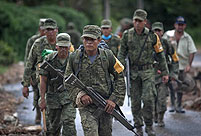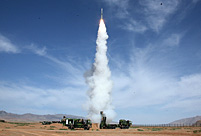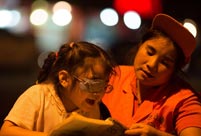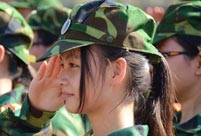DAMASCUS, Sept. 23 -- Despite overrunning many areas of Syria, the rebel Free Syrian Army (FSA) received a blow from its former main ally al-Qaeda, forcing the political opposition to reconsider its attitudes and agree to take part in negotiations with the Syrian government to reach a solution to the Syrian crisis.
Fights have lately erupted between the FSA and al-Qaeda- affiliated the Islamic State of Iraq and the Levant (ISIL), which aims to establish a Sunni state in Syria and Iraq. The ISIL combines more than 100,000 fighters globally, according to recent estimates.
The ISIL has presumably joined the FSA to help topple the Syrian regime. However, its real intentions have been disclosed over time and it overtly declared that it wants to establish an Islamic state, a step that is widely rejected by most Syrians in favor of a moderate state.
ISIL has controlled the Azaz city on the Syrian-Turkish borders and the fighting with the FSA has spread to Aleppo's countryside, where the ISIL has reportedly been launching attacks against the FSA.
Local media reported that the ISIL has breached a recent truce reached with the "Brigade of the Storm of the North," which is affiliated with the FSA.
The fighting has also spread to Hasakah and Deir el-Zour provinces in northeastern Syria, where the ISIL and its main ally al-Nusra Front had clashes with the Kurds and killed more than 300 of them.
The fighting is expected to take a further dangerous curve between the two groups, especially following the death of Abu Abdullah al-Libi, the ISIL Emir, who was shot in Bab al-Hawa in northern Syria during clashes with the FSA's fighters.
Local reports claimed that the FSA has retreated under the strikes of the ISIL, adding that the extremist group is seeking to control the strategic Daraa area in southern Syria.
The ISIL tries to overrun strategic areas in the country in a bid to undermine the negotiations between the Syrian government and the opposition.
The FSA spokesman recently announced that he does not understand what al-Qaeda wants, adding "we lost more than 550 FSA martyrs in battles with al-Qaeda and al-Nusra Front... The battles are now within the opposition and are no longer with the Syrian army.
The new development has become of a great concern for the United States and Europe as fears are mounting among them of the spiraling danger of al-Qaeda in the area.
The Syrian National Coalition (SNC), the main opposition group in exile, announced in a recent statement that the practice of the ISIL is a "breach of the principles for which the Syrian revolution erupted."
Observers say that the concerns of the Syrian crisis should focus in the next phase on the fight against al-Qaeda and on how to support the moderate opposition with the international community and these will give the Syrian government new cards to do the job.
Moreover, head of the SNC, Ahmed al-Jarba, announced that the opposition is ready to attend the Geneva conference proposed to resolve the conflict in Syria.
Al-Jarba's statement makes the first clear commitment by the SNC that the West-backed Syrian opposition is to participate in the proposed conference, sponsored by the United States and Russia, in order to end the two-and-a-half-year fighting in Syria.
The coalition has been hesitant about attending the conference and has for long stipulated that President Bashar al-Assad has no role in the transitional government.
However, the conference gained momentum following the infighting between the once allied groups, especially as the FSA's fighters have shown rising resentment with the atrocities committed by the ISIL.
The Syrian government made it clear that it would never hold talks with extremist groups, especially al-Nusra Front.
Syrian Deputy Foreign Minister Faisal Mekdad said the government cannot accept the representation of extremist groups belonging to al-Qaeda in the Geneva II conference, adding that "I think that the U.S. and other Western countries will not be able in any way to force the Syrian government to hold talks with al- Qaeda and terrorists."
Mekdad stressed that al-Nusra Front and the ISIL are among the groups which Syria will never talk to.
On May 7, both Moscow and Washington said they had decided to hold an international conference in Geneva designed to facilitate a solution to the Syrian crisis through political dialogue.
The planned, yet delayed, conference is a follow-up to last year's international meeting in Geneva that drafted a peace roadmap for Syria but was never materialized.
 Storms leave 97 dead, 58 missing in Mexico
Storms leave 97 dead, 58 missing in Mexico New model of indigenous surface-to-air missiles testfired
New model of indigenous surface-to-air missiles testfired  118.28-carat diamond to be auctioned in HK
118.28-carat diamond to be auctioned in HK Maternal love under streetlight
Maternal love under streetlight Naked foreign student sits in the middle of a road in Haikou
Naked foreign student sits in the middle of a road in Haikou  Colorful Yunnan: Enjoy the natural beauty
Colorful Yunnan: Enjoy the natural beauty Harbin named Chinese city with most beautiful women
Harbin named Chinese city with most beautiful women New college students' military training in Guangzhou
New college students' military training in Guangzhou Rugby girls
Rugby girls PLA's 38th Group Army conduct training
PLA's 38th Group Army conduct training Residences of the royal house of Savoy
Residences of the royal house of Savoy The last days of Wan Aihua
The last days of Wan Aihua Highlights at 12th National Games of China
Highlights at 12th National Games of China Beijing Film Academy welcomes freshmen
Beijing Film Academy welcomes freshmen Large mahjong party sets new world record
Large mahjong party sets new world recordDay|Week|Month